
One of my favourite DVD commentaries I’ve ever heard is John Cleese’s on the Fawlty Towers Remastered box set.1 Of course, I could listen to John Cleese talk about comedy forever and a day, but more than that: it’s rare to hear someone of his generation so utterly committed to the art of giving a good commentary. Having clearly rewatched the episodes in preparation, there are very few awkward pauses; the whole thing is dense with facts. Moreover, rarely has someone been so endlessly generous in talking about the talents of the cast of a show… and genuinely makes you appreciate why they are so good, rather than just gushing.
My favourite thing about the commentary, though?2 His thoughts, 30 years later, as to which parts of Fawlty Towers are his favourite, and which bits he likes the least. The former have been talked about before – Basil’s Best Bits on Gold, for example – but I find the latter especially interesting. Having read a number of ill-thought-through criticisms of Fawlty Towers over the years, it seems the only person who actually has any sensible ones is a certain J. Cleese.
Here then, are some of his least favourite things about the show, as taken from his commentary. I’ve picked what I think is his most interesting criticism of each episode. Enjoy.
A Touch of Class
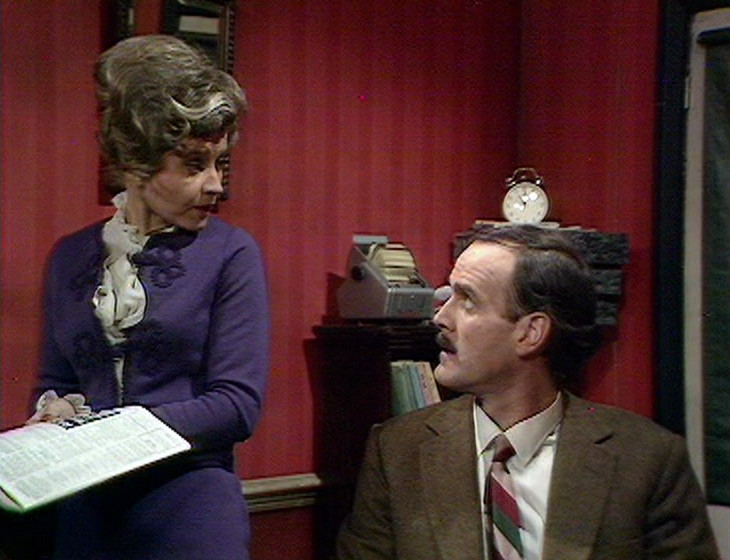
On the early dialogue scene in the back office, where Basil and Sybil discuss the advertisment Basil put in the newspaper:
CLEESE: I have a slight criticism of this scene, which is there’s so much plot set up in it. Latterly, I think Connie and I got better at setting up plot because you see if you set up plot in such a way that there’s not much humour in it, the audience almost at a unconscious level registers the fact that it is plot… and also on an unconscious level perhaps they kind of think ahead and a part of their mind is beginning to see how the story might pan out. So what Connie and I normally did was to try and hide the plot points in humour. Here, the plot points and the setups are made a little bit seriously; it’s as though the comedy backs off for a bit while we sort of set up what’s going to happen, and I think we did the subsequent episodes better when we were setting up the plot.
The Builders
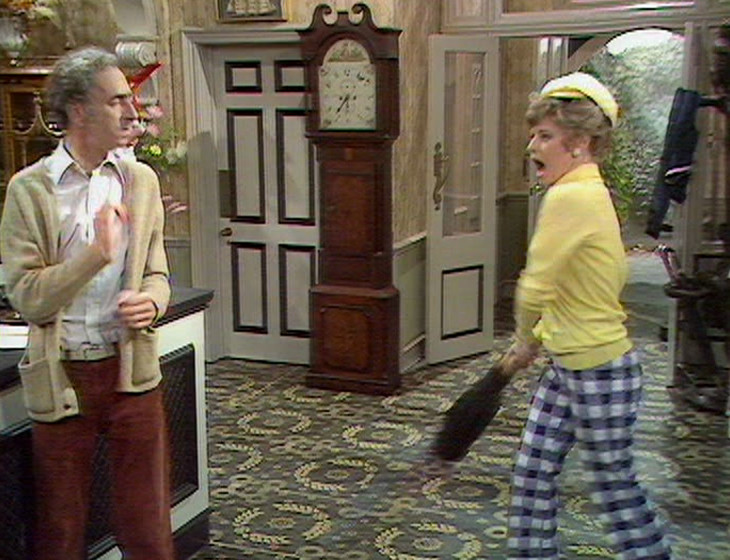
On the scene where Sybil loses her temper, kicks Basil and whacks O’Reilly with her umbrella:
CLEESE: There’s one problem about dear dear Pru… and that is she’s just too damn nice. She is so kind and concerned about everyone, and you’ll notice that when she’s being mean and nasty physically she doesn’t go at it in the way that Andrew and I do. Andrew and I know you got to take a few knocks and expect to bang yourself and hurt yourself a little bit, but you see she wouldn’t kick me properly so we had to shoot it like this so that we could mime it all.
The umbrella is a funny shape cos it’s been padded – and Pru did not hit him hard enough, she’s too damn nice. She should have really clocked him… You’ve absolutely got to go for it in physical comedy. You cannot hold back, because it immediately signals to the audience that you’re holding back a little bit, and that reminds them that it’s not real.
The Wedding Party
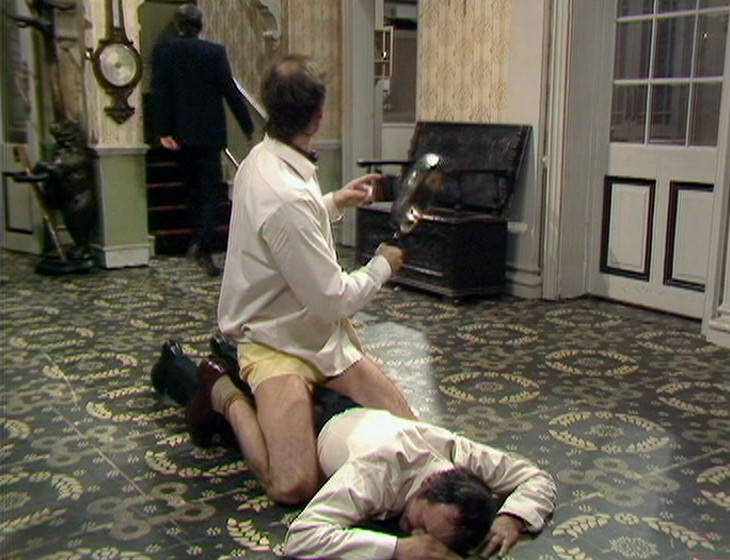
On the climax of the episode, where Basil attacks Manuel whilst the wedding party look on:
CLEESE: I come up and I whack it – and I drop the saucepan for some reason, I have to go and get it. Why did I do that? It messes it up, it’s not a nice clean movement.
Now, there’s the moment… where we should see what they are looking at. There should be a shot there… and ideally in a movie it would be from their point of view, but you can’t in a television studio get a camera round behind the actors like that, but it would have been far better as I say if there had been a moment where that tableau had been frozen.
Of course, these days it would be far easier to shoot a separate shot showing their point of view, and drop it in in the edit. Though I can’t help but feel it might feel rather odd.
The Hotel Inspectors
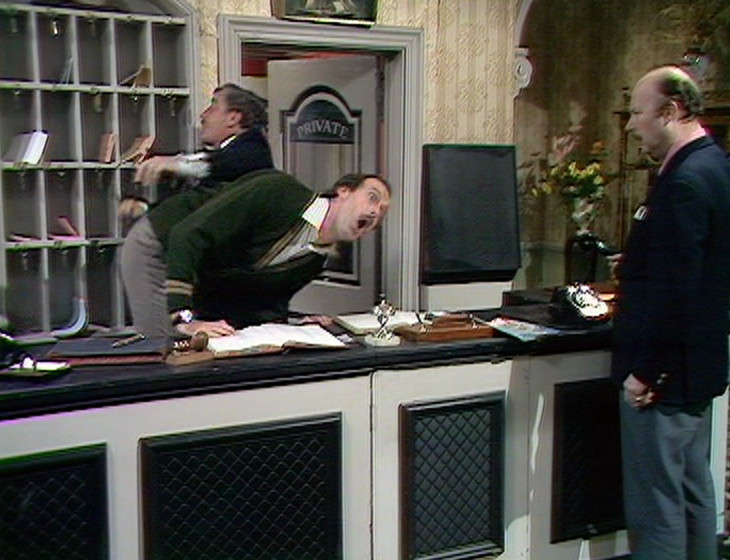
Very little for Cleese to criticise here, which he calls “one of my very favourite episodes.” But he isn’t that keen on his acting where Basil is beaten up by Mr. Hutchinson:
CLEESE: I don’t think my reactions to being hit are quite realistic enough… I shouldn’t be in too much pain. When I come up now I don’t think I quite act this right.
And once he’s been thoroughly beaten up and trying to converse with Mr. Walt:
CLEESE: Again, I don’t think I’m playing this quite right. I don’t think I’d played dialogue against being injured before, and I’m sure I could have found a better way of doing it.
Gourmet Night
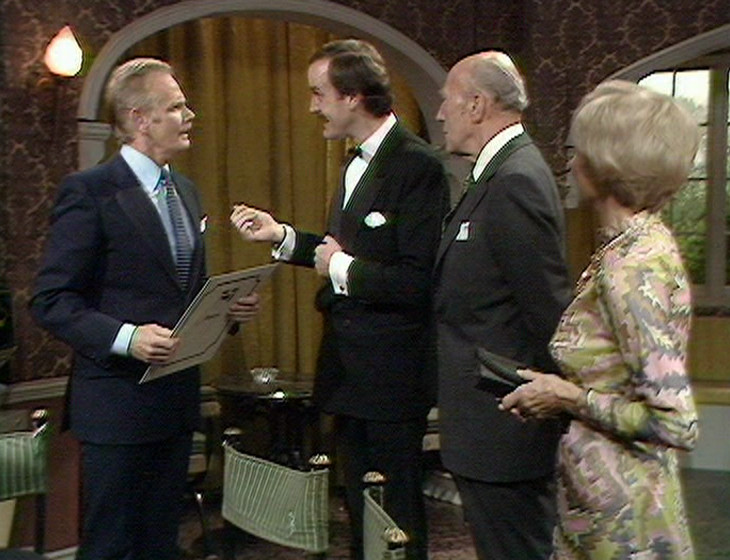
A very interesting comment from Cleese about the final two episodes of the first series:
CLEESE: Now, what I notice about this episode is that perhaps the irony is that of the two episodes most liked by the British public, which I think are Gourmet Night and The Germans, they’re the episodes that have more things in them that I don’t personally like.
I’ll pick out the following as the most enlightening criticsm of this episode:
CLEESE: Now, what’s interesting here is that one of the best-loved jokes in Fawlty Towers, which is Basil fainting, is I’m afraid totally misunderstood by everyone who’s ever seen it, because – it is entirely Connie’s and my fault – it’s not set up properly. When Basil faints because he cannot remember Mr. Twitchen’s name, it’s not actually because he can’t remember Mr. Twitchen’s name. He can – but he’s talking to a man whose head is constantly twitching… and he doesn’t like to say “this is Mr. Twitchen” to someone whose head is twitching because that might annoy that person. So that’s actually what the joke is.
I have to say, I definitely misinterpreted the joke in exactly the way Cleese describes, and thought Basil just couldn’t remember the name.
The Germans
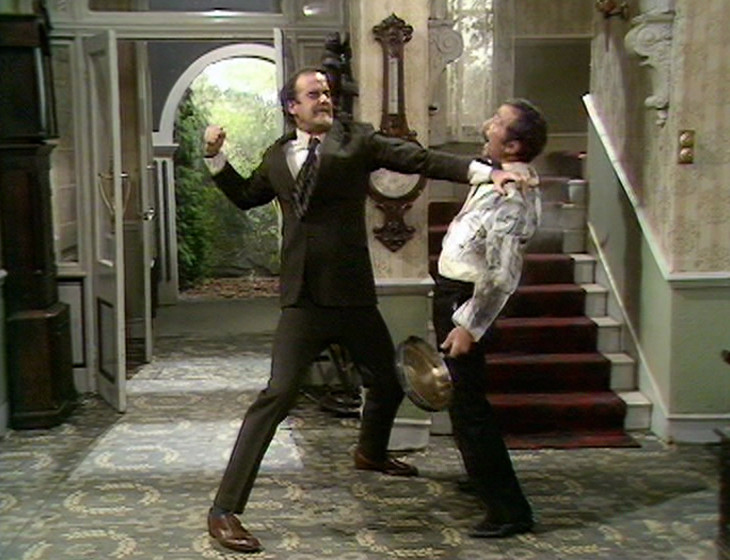
Interestingly enough, Cleese saves his most venomous criticism of the whole of the 12 episodes for a section which he otherwise thinks is one of the best scenes in Fawlty Towers. At the end of the fire drill sequence:
CLEESE: Now there’s one bit of very good business, and one dreadful bit of business. The way that Andrew pulls this cord off… and I get it in the face: that’s good, that’s funny, right – I do that OK. But now this is terrible – he holds the pan there and I straighten up into it, and that’s supposed to be enough to knock me out! And that’s pathetic! That’s really, really bad, and I am ashamed of it. Look, he’s supposed to be knocked out with concussion having stepped up into it! We should have found a way for me to bang my head unbelievably hard, it would have made a very funny savage end to the whole sequence.
I’ve always thought this bit didn’t quite work either, so it was a delight to find out that Cleese felt the same. This means I am as good at comedy as John Cleese.
Communication Problems
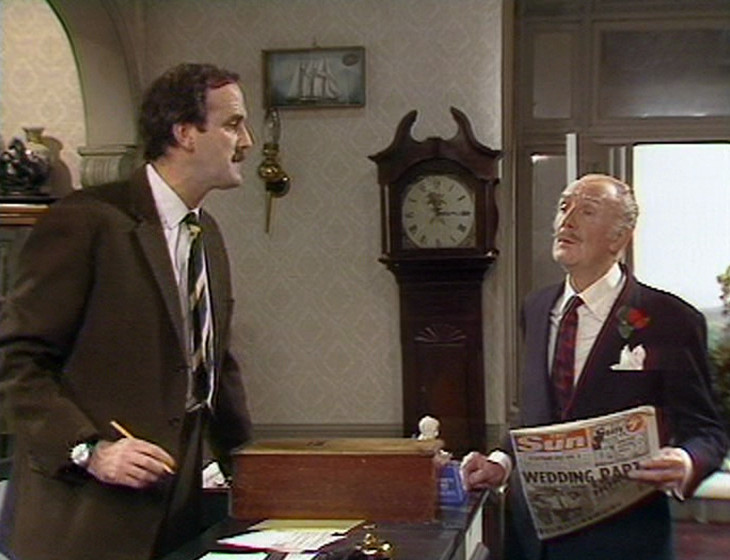
Onto Series 2, and it’s notable that Cleese finds generally far less to criticise here than with the first series – and the criticisms become increasingly thin on the ground as the series goes on. But there’s still some interesting observations; note what he says about the Major in the first scene of the episode:
CLEESE: Now I’m very surprised here to see – as you’ll be able to see in a moment – the Major is reading The Sun, which doesn’t feel quite right from the point-of-view of his character, and I think it may have been something provided by the props department, and during the course of the day’s rehearsal when there was rather a lot to think about, I must have missed it and maybe everyone did. But there he is, reading The Sun.
I’m not sure it especially bothers me. I think The Major reads The Sun for the sports pages.
The Psychiatrist
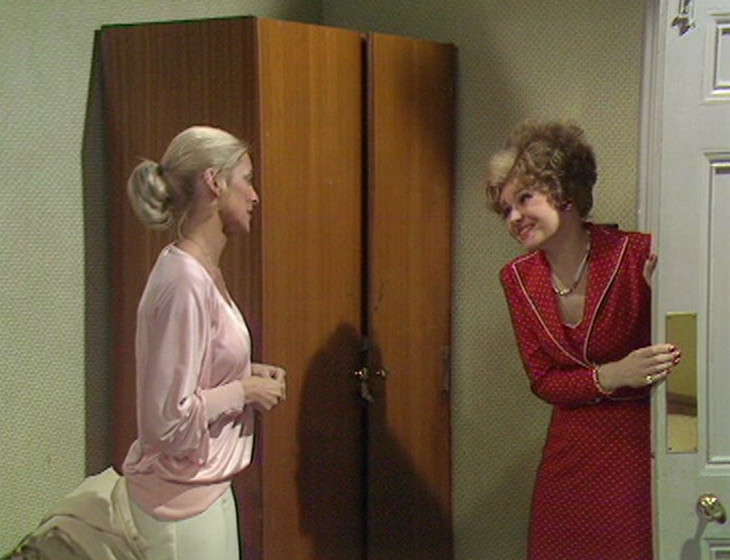
On the scene where Basil hides in the wardrobe:
CLEESE: Now there’s one thing wrong here, and that’s the shadow. You see where Basil’s finger is there, by the lock or by the knobs, we don’t see it so clearly just because it’s shadowed. And as you’ll see later on, this show was something like 35 minutes long, so trying to get this all recorded in the two hours available: you can’t get everything right.
Two hours. I’ve been to certain sitcom recordings which have lasted over four hours. Anyway, chalk this one up as “one of those things which never bothered me, but will now irritate me every single time I watch the episode”.
Waldorf Salad
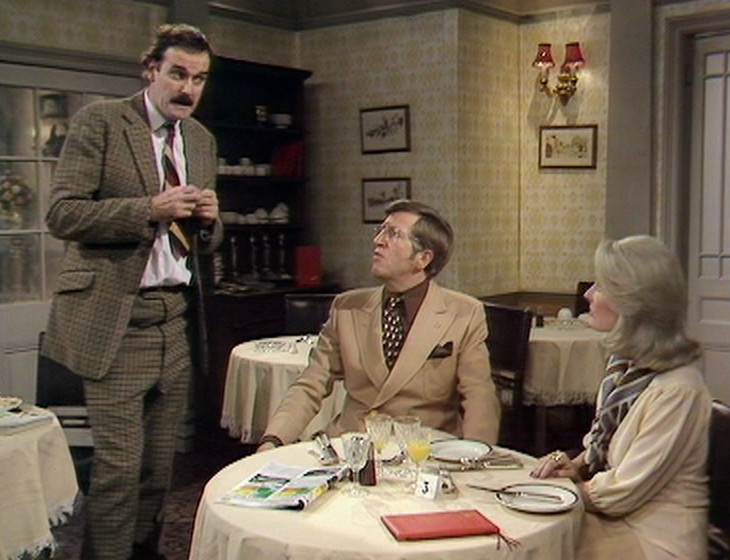
Cleese musing on a single line of Mr. Hamilton’s dialogue, “I don’t think I ever will, either”:
CLEESE: Would it have been better if he’d just said ‘I don’t think I ever will’? Did we need the either? If you put an extra syllable in if it isn’t necessary it always somehow softens the impact of the line in a way that makes it less funny. Brevity is the soul of wit they said: it’s certainly the soul of scriptwriting comedy.
I highly enjoy Cleese picking at single words of his and Connie’s scripts thirty years later.
The Kipper and the Corpse
On the film sequence where Mr. and Mrs. White attempt to escape the hotel and crash as they are distracted by the corpse:
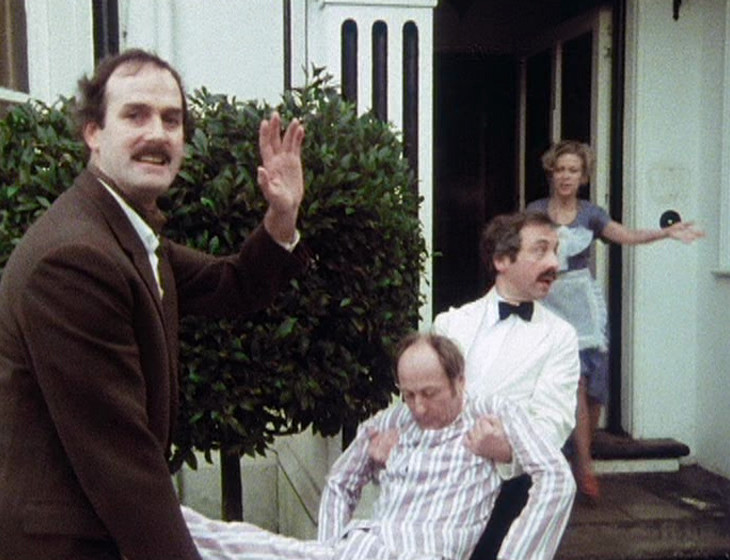
CLEESE: Now, this is a bit clumsily done, you see, because we go back – we didn’t need that shot [the shot of Basil & Co carrying the corpse back into the hotel], we didn’t need that shot [the car moving out of shot and crashing], we should have just put a crash on here [once Basil is carrying the corpse through reception]. It would have been much more effective.”
I find Cleese’s instinct to cut back on certain things some of the most interesting things of all. (On the other hand, once the Whites walk through reception after their accident, Cleese mentions he wishes they’d been given head injuries, which is a deliciously unpleasant thought.)
The Anniversary
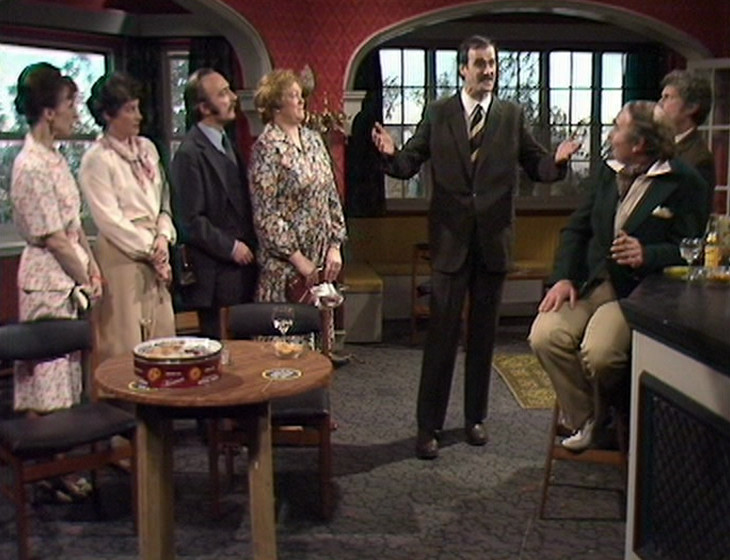
On Roger’s reaction to Basil saying “You think that was Sybil in the car and she’s not upstairs, is that it?”:
CLEESE: I love Ken’s reaction to that. We should have got that in a close-up but we probably couldn’t get a camera in the right place. You see, in television you just got to have the four cameras out the front – you can’t put them round the side or back to get reaction shots because they’d be in shot from another camera. That’s why so much of the blocking here consists of four or five people just standing in a line – you can’t block it any other way in television. In a movie, you could.
Of course, these days it would be far easier to do pick-up shots and edit these things in manually. (How much it would be worth doing in terms of potentially losing the energy of the programme is a judgement call, of course.)
Basil the Rat
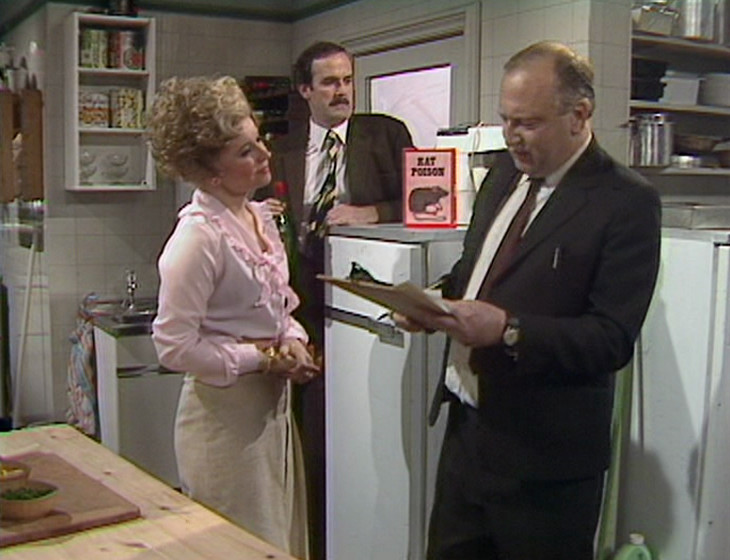
Oh, go on then. For an episode which Cleese reveals is his “favourite episode of Fawlty Towers“, I can’t quite bring myself to use a quote where Cleese slags off a slightly crappy Rat Poison prop, or thinks Andrew Sachs could have come in on his cue slightly earlier. Instead, let’s end the article on something nice, shall we?
CLEESE: Now, the reason I like this episode so much is that I think in terms of confusion and chaos and frenzy, it’s almost the most consistent. I think what makes it very good is that once the rat poison gets introduced, we might be talking about a serious, serious problem like the death of a human being, which causes the fear to reach unprecedented heights.
I think you can always claim that in farce there is something that has happened or is happening that the protagonist has to cover up – and in this particular case, with the food inspector here… and his ability to close the hotel down, it starts at the very beginning, with a lot of what the Americans call “jeopardy”. There’s a lot to lose from the very beginning, and we go from the hotel being closed down to Basil being up on a murder charge.
There you go. More potential murders in your sitcoms please, everyone.
As I say, I highly recommend purchasing the Fawlty Towers Remastered DVD, even if you already own Fawlty Towers on DVD. It’s a wonderful set of commentaries from Cleese – up there with anything Armando Iannucci or Pegg/Wright have done. One of the best commentaries ever for one of the best sitcoms ever.
Six hours of your life well-spent.

4 comments
Sarah on 10 March 2015 @ 6am
This was interesting! Love it when you get a good commentary, Cleese does deliver, one of my faves is the holy grail commentary by pairs of pythons, both sets give insights
Made me want to give fawlty towers another go, I never really took to it, hard coming from anarchic self aware young ones to something that at the time seemed like old fashioned formulaic sitcoms. The hype doesn’t help!
Matt on 1 January 2017 @ 3pm
Re the Gourmet Night Twitchen gag – it was explained in the ‘Just the Words’ script book, but of course Cleese is right, they don’t emphasise the name enough
Garry in sunny Bushey Heath on 3 April 2017 @ 6pm
Regarding “Gourmet Night”, not “everyone” misunderstood why Basil ‘fainted’ – it never occurred to me that he’d forgotten Twitchen’s name. I had always thought that in order to get out of having to say the name in front of the twitching man, Basil pretended to faint.
John Hoare on 4 April 2017 @ 4am
It’s interesting – I’ve had more pushback on that part of the article than anything else I’ve ever put on this site!
Cleese is clearly overgeneralising, though I’m sure he’s right that enough people misinterpreted the joke that it would have been better to flag it a little better.
Comments on this post are now closed.